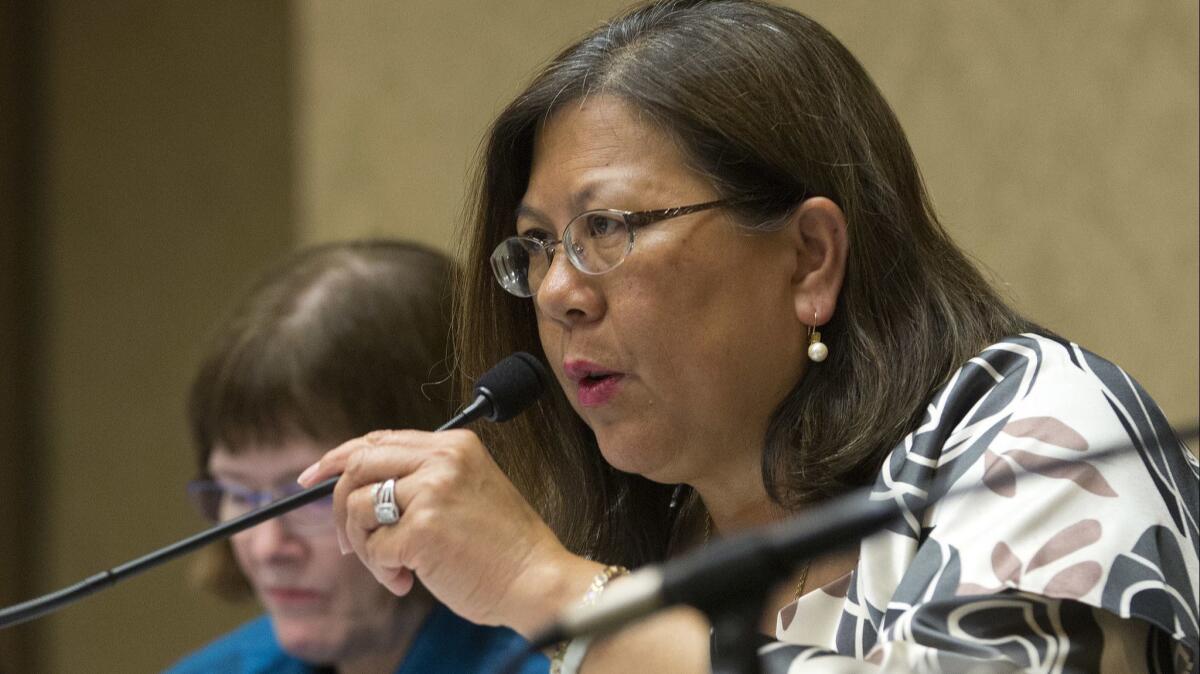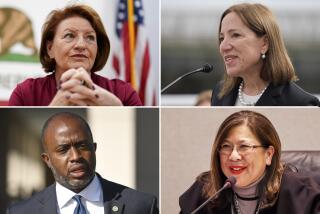Endorsement: Betty Yee deserves another term as California’s controller

When Democrat Betty Yee ran for state controller four years ago, we weren’t persuaded that she was better prepared for the post than her Republican opponent, Fresno’s then-Mayor Ashley Swearengin, whom we endorsed. Yee won, of course, and we’re pleased to acknowledge that she has performed her official duties well. We enthusiastically endorse her for reelection.
The choice was made even easier by the doldrums in which the California Republican Party has found itself. This is yet another statewide race in which the best the Republicans could come up with is a candidate — Anaheim businessman Konstantinos Roditis — with little public service history, no statewide name recognition, comparatively few donors (his campaign is primarily self-financed) and a limited sense of how the office that he seeks actually works. Roditis also is pushing a hare-brained “trickle up taxation” proposal to have local governments collect all taxes and set policy for many programs, then pass on to the state government only the money it needs to fulfill its statewide responsibilities, which would be a logistical and policy nightmare.
Many voters are uncertain about exactly what it is that the state controller does. Briefly, the controller oversees the state’s bill-paying, including payrolls for state government and the California State University system. The office also audits state agencies and departments as well as lower levels of government, such as school districts, cities and water authorities. The controller also sits on about 70 boards and commissions, a range of financing authorities and the boards of the state’s two largest public employee pension systems.
Yee was instrumental in unscrambling the mess that was the Board of Equalization.
In addition to satisfying the fundamental requirements of the office, Yee has focused on developing a framework for tax reforms to help stabilize the state’s revenues by better diversifying tax streams (such as reducing the sales tax but broadening it to apply to services, as most other states do) and to deal with the enormous unfunded liabilities in public employee pension funds. Those issues must be resolved by the Legislature, governor and, to some measure, voters, but Yee is well positioned to push potential solutions — and vet those offered by others. Her ideas are far more sensible and feasible than Roditis’.
Yee recognizes the risks posed by the state’s overreliance on its wealthiest earners; the top 10% pay $4 of every $5 the state collects in income taxes. Those revenues are particularly sensitive to changes in the economy, so a recession — which Yee recognizes will happen eventually — means a significant drop in state tax receipts. It’s notable that other than the 1978 approval of Proposition 13 to limit property tax increases, California has not had a significant overhaul of its tax system since 1935.
Two years ago, the controller’s office released a report outlining the scope of the tax reform issues that ought to be addressed, and Yee says she hopes to have a full set of “policy considerations” ready by the end of the year. Significantly, she argues that the state cannot keep enacting one-off taxes to close budget holes; in making decisions about taxes, it must take a wide and long-range view of the state’s needs and best interests.
Yee also was instrumental in unscrambling the mess that was the Board of Equalization, a five-member tax-appeals panel (including the controller) established under the state Constitution in 1879. Over recent decades, individual board members have built political fiefdoms through nepotism and the improper use of civil servants, and with little transparency. Persistent complaints by Yee, who served on the board before her election as controller in 2014, and current board member Fiona Ma (who is now running for state treasurer) led to investigations that culminated in a 2017 law stripping the board of nearly all of its duties and staff, reducing the body to the minimum required under the Constitution. Yee has also pushed a measure that would ask voters to dissolve the board altogether — a move we wholeheartedly support.
The last decade has been a trying one for the state as it recovered from the last recession, and only a fool would think another downturn isn’t inevitable. If it comes in the next four years, Yee is by far the better choice to be in the controller’s office.
Follow the Opinion section on Twitter @latimesopinion or Facebook
More to Read
A cure for the common opinion
Get thought-provoking perspectives with our weekly newsletter.
You may occasionally receive promotional content from the Los Angeles Times.










